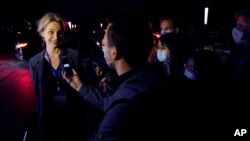A member of the World Health Organization team that recently visited China to investigate the origins of the coronavirus told Reuters that China has not handed over data on 174 cases of the virus identified in the early phase of the outbreak in the city of Wuhan.
Dominic Dwyer, an Australian infectious diseases expert, said the team was given a summary but not the raw data known as “line listings,” which includes questions asked of the patients, their responses, and the analysis of the responses.
Dyer said the team “persisted” in asking for the line listings. He said he could only “speculate” about why the team did not get what it asked for, but noted that, “The WHO people certainly felt that they had received much more data than they had ever received in the previous year.”
Oxford/AstraZeneca has announced that it will test its coronavirus vaccine on 300 children between the ages of 6 and 17. The Oxford shot is one of three that has been approved for use on adults in Britain but has been shown to be not as effective on some variants of the coronavirus.
The chief investigator of the children’s trial, Andrew Pollard, who is a professor of pediatric infection and immunity, said, “While most children are relatively unaffected by coronavirus and are unlikely to become unwell with the infection, it is important to establish the safety and immune response to the vaccine in children and young people as some children may benefit from vaccination.”
Children should play this summer to help them cope with the upheaval the COVID-19 pandemic has brought, according to a group of British child development specialists.
PlayFirstUK, in a letter to Britain’s education secretary, said, “This spring and summer should not be filled with extra lessons. ...Social connection and play offer myriad learning opportunities and are positively associated with children’s academic attainment and literacy.”
PlayFirst’s recommendation follows a recent British controversy after two young children who built a snowman in a park were ordered home by police officers, who told them to go home and play in their own garden.
A prime minister’s spokesperson has since said it is fine for children to play outside.
Meanwhile, the U.S. Centers for Disease Control and Prevention urged educators Friday to reopen schools and provided a science-based plan for the reopening of schools. Dr. Rebecca Same, an assistant professor in pediatric infectious disease at Washington University in St. Louis, told The New York Times, “I completely understand teachers’ and other school employees’ fear about returning to school, but there are now many well-conducted scientific studies showing that it is safe for schools to reopen with appropriate precautions, even without vaccination.”
New Zealand has recorded a recent death from the coronavirus and two more infections were recorded Saturday. New Zealand reports that it has 45 COVID-19 infections and 25 people have died from the virus.
The number of COVID-19 infections around the world continues to climb, with more than 108 million global infections since the start of the outbreak, according to the Johns Hopkins Coronavirus Resource Center. The U.S. continues to have the most infections, with more than 27 million, followed by India with nearly 11 million cases and Brazil with more than 9 million, according to Hopkins.




